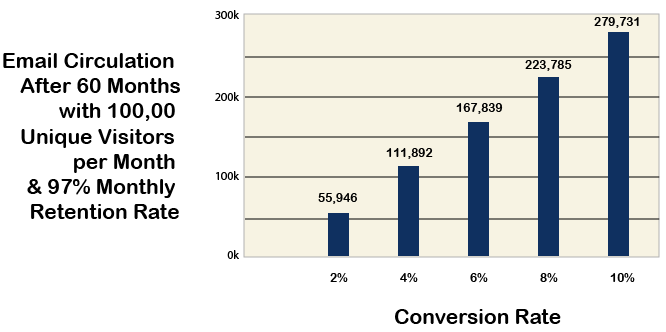Maximize your subscriber file size with aggressive email conversion architecture.
Discover how to forecast and increase profits with the Mequoda Email Circulation Calculator.
Fundamentally, there are only two ways for any business to increase profits.
Want to make more money? Either increase the number of customers, or increase the average sale per customer. Or both.
The success of your online publishing business depends on the same two factors. The important variables are:
- Number of email subscribers and
- Average revenue per subscriber.
The size of your email subscriber file is paramount.
Let’s say you’re in a small, niche market. After extensive search engine optimization and link building efforts, you determine that your site’s unique visitor count will level off at about 100,000 per month.
Any website analytics tools can measure your unique monthly visitors, but projecting optimal email circulation requires a calculation.
- What is an acceptable email conversion rate (ECR) for your business goals?
- If you assume the ECR will be constant at that given percentage over 60 months, where will your email circulation level off?
The answer is a linear equation. The relationship between the ECR and email file size produces a straight-line graph when you hold all other variables constant.
If you can double your ECR, you will double the size of your subscriber file over five years (or any fixed period).
[text_ad]
Your ECR is a simple ratio: The number of unique visitors that come to your website during a 30-day period, divided into the number of visitors who join your database by signing up to receive your free email newsletter during that same 30-day period.
If during a given month you have 100,000 unique visitors arrive at your website (according to Google Analytics or a comparable measurement tool) and 4,000 of these unique visitors become new email subscribers (according to your email management program or service), your ECR is four-percent (4,000/100,000 = .04 or 4.0%).

The Mequoda Email Circulation Calculator I used to make this chart assumes that all other variables are held constant (100,000 unique visitors per month, and a 97-percent retention rate do not change over the five year period).
The relationship between the ECR and file size, with all other variables held equal, is linear. ECR is a direct driver of file size.
[text_ad]
If your ECR is not four percent or more, you’ve got some work to do!
ECR dictates revenue and profitability.
The ECR for Mequoda Daily was 6.4 percent for February 2009. The lowest sustained email conversion for any Mequoda website that we have designed is about 2.5 percent. Most are much higher.
That’s because the design priority for these websites places a premium on capturing the email addresses of casual visitors and adding them to the database. The website architecture is designed to make ECR Job One.
So, what’s your site’s ECR? If it isn’t four percent or more, you’ve got some work to do!
Do you wonder what other publishers are doing, that you can emulate?
What’s causing their email conversion rates to be so much higher, and their email subscriber file to be so much larger?
Why are their businesses so much more profitable?
You can discover the answers to these questions and many more when you join Kim, Amanda and me at the Mequoda Summit.
Discover how to improve your ECR, maximize your email circulation and 11 other information-packed sessions covering SEO, advertising sales, budgeting, staffing, editorial strategy, email marketing, and link-building, plus dozens of fully updated Mequoda research trends and case studies at the Mequoda Summit.
The Mequoda Email Circulation Calculator is a simple mathematical projection that enables you to determine how big your email subscriber file will be after five years. The relationship between ECR and the file size, with all other variables held equal, is linear.
It is one of eight software tools and plug-ins made available to Mequoda Summit Attendees and Mequoda Pro Members.


